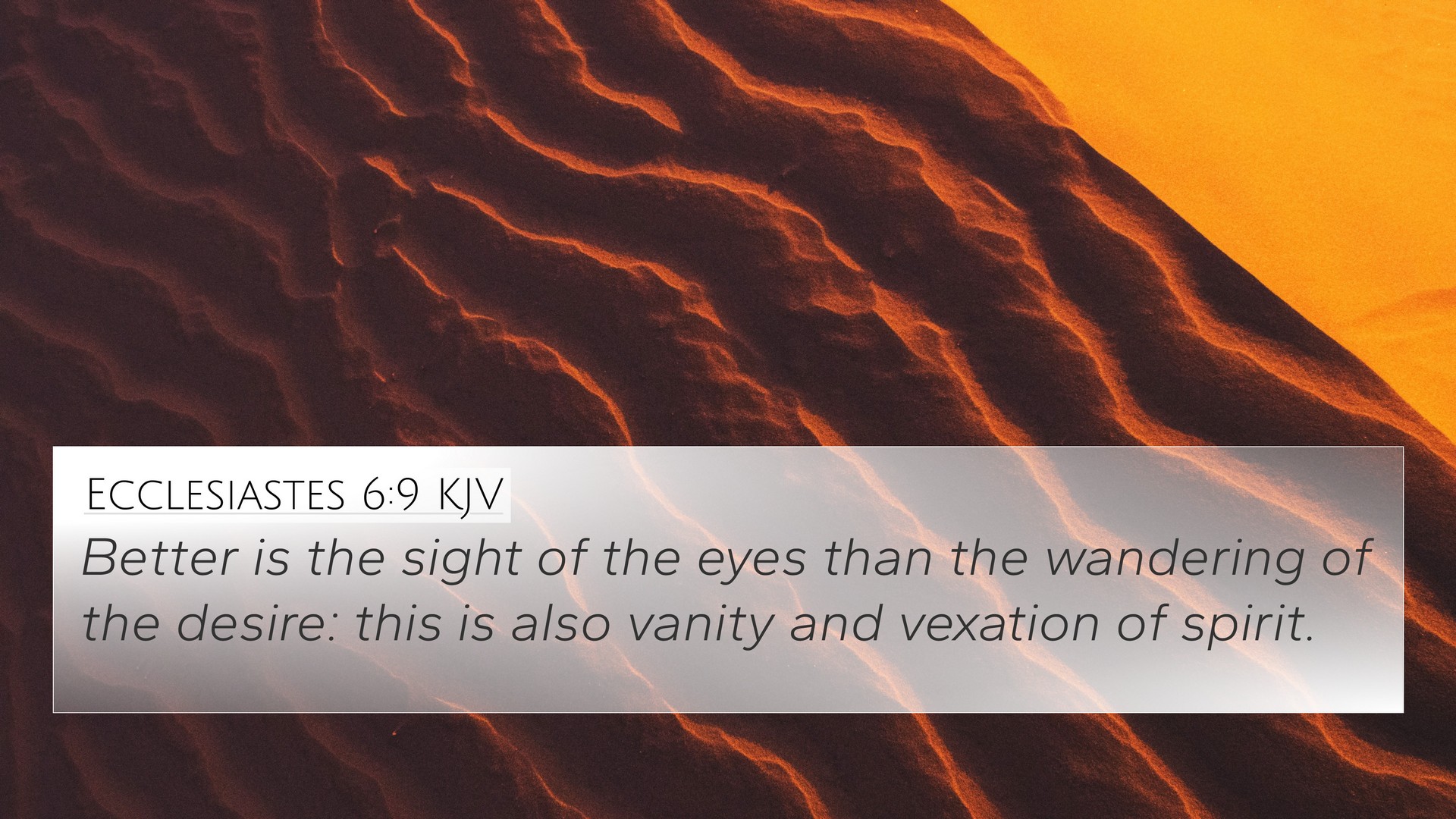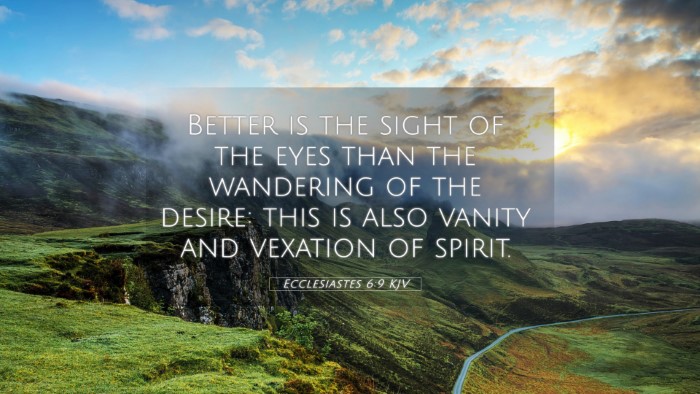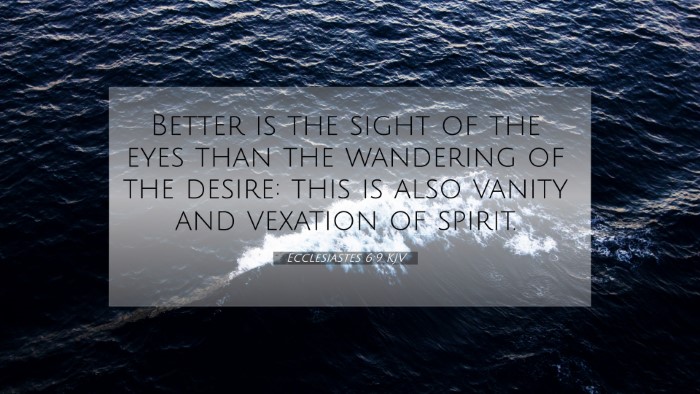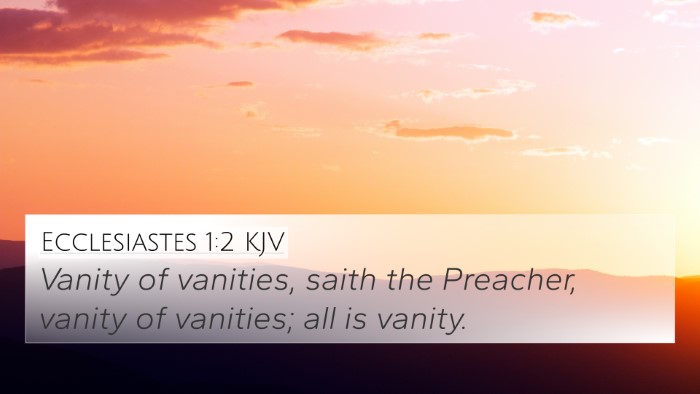Old Testament
Genesis Exodus Leviticus Numbers Deuteronomy Joshua Judges Ruth 1 Samuel 2 Samuel 1 Kings 2 Kings 1 Chronicles 2 Chronicles Ezra Nehemiah Esther Job Psalms Proverbs Ecclesiastes Song of Solomon Isaiah Jeremiah Lamentations Ezekiel Daniel Hosea Joel Amos Obadiah Jonah Micah Nahum Habakkuk Zephaniah Haggai Zechariah MalachiEcclesiastes 6:9 Similar Verses
Ecclesiastes 6:9 Cross References
Better is the sight of the eyes than the wandering of the desire: this is also vanity and vexation of spirit.
Uncover the Rich Themes and Topics of This Bible Verse
Listed below are the Bible themes associated with Ecclesiastes 6:9. We invite you to explore each theme to gain deeper insights into the Scriptures.
Ecclesiastes 6:9 Cross Reference Verses
This section features a detailed cross-reference designed to enrich your understanding of the Scriptures. Below, you will find carefully selected verses that echo the themes and teachings related to Ecclesiastes 6:9 KJV. Click on any image to explore detailed analyses of related Bible verses and uncover deeper theological insights.
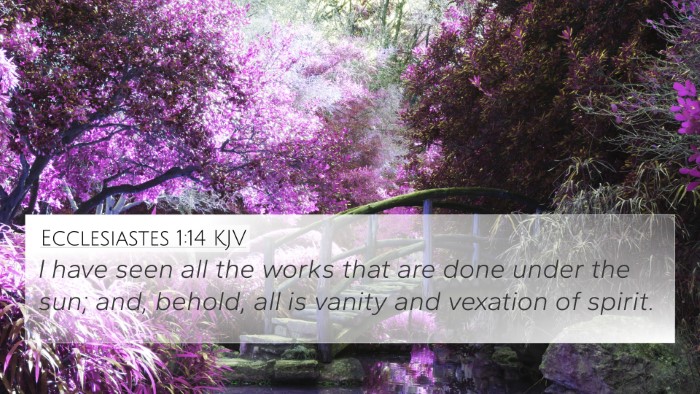
Ecclesiastes 1:14 (KJV) »
I have seen all the works that are done under the sun; and, behold, all is vanity and vexation of spirit.
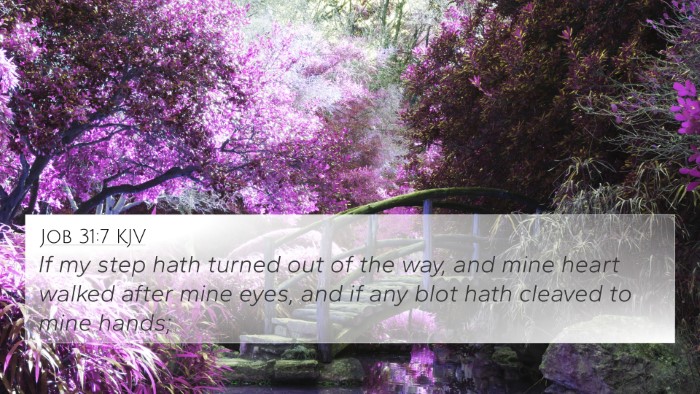
Job 31:7 (KJV) »
If my step hath turned out of the way, and mine heart walked after mine eyes, and if any blot hath cleaved to mine hands;
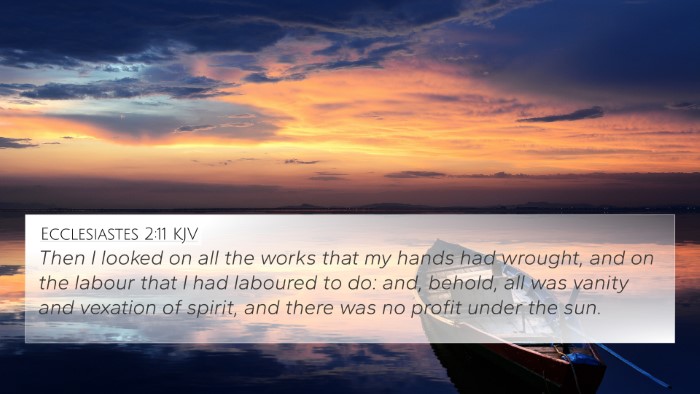
Ecclesiastes 2:11 (KJV) »
Then I looked on all the works that my hands had wrought, and on the labour that I had laboured to do: and, behold, all was vanity and vexation of spirit, and there was no profit under the sun.
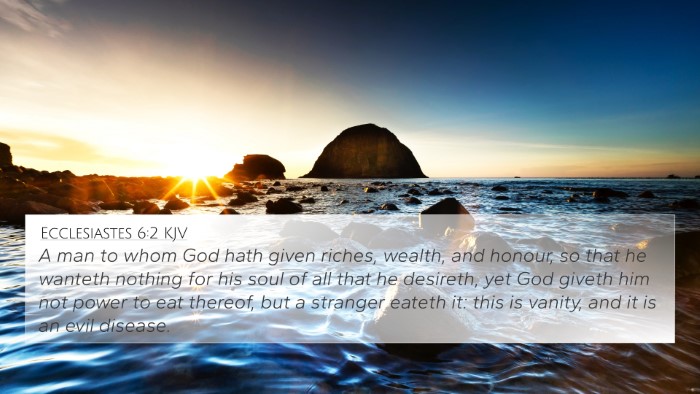
Ecclesiastes 6:2 (KJV) »
A man to whom God hath given riches, wealth, and honour, so that he wanteth nothing for his soul of all that he desireth, yet God giveth him not power to eat thereof, but a stranger eateth it: this is vanity, and it is an evil disease.
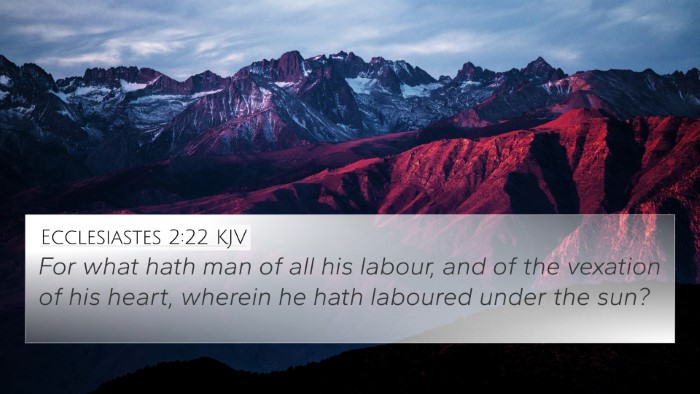
Ecclesiastes 2:22 (KJV) »
For what hath man of all his labour, and of the vexation of his heart, wherein he hath laboured under the sun?

Ecclesiastes 3:12 (KJV) »
I know that there is no good in them, but for a man to rejoice, and to do good in his life.
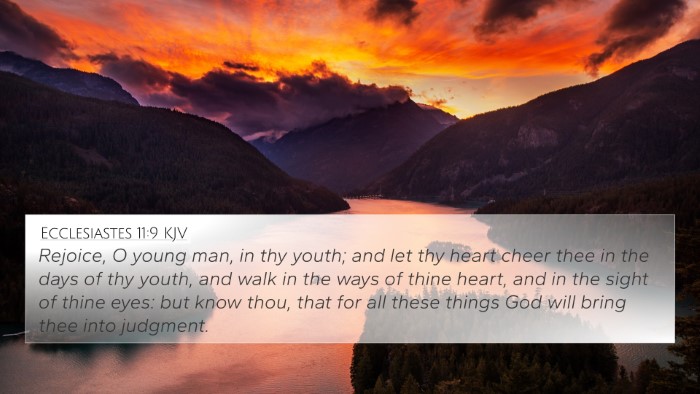
Ecclesiastes 11:9 (KJV) »
Rejoice, O young man, in thy youth; and let thy heart cheer thee in the days of thy youth, and walk in the ways of thine heart, and in the sight of thine eyes: but know thou, that for all these things God will bring thee into judgment.
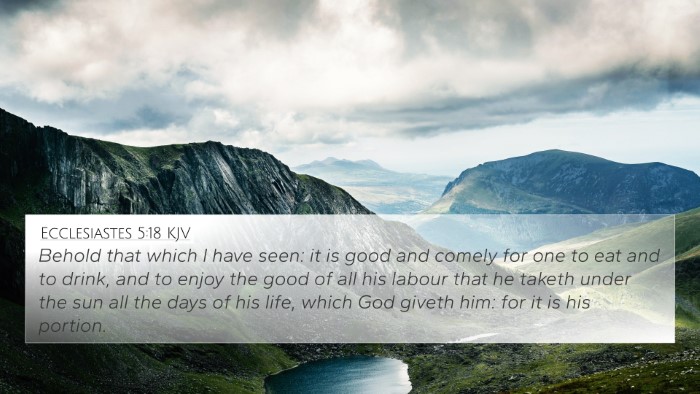
Ecclesiastes 5:18 (KJV) »
Behold that which I have seen: it is good and comely for one to eat and to drink, and to enjoy the good of all his labour that he taketh under the sun all the days of his life, which God giveth him: for it is his portion.
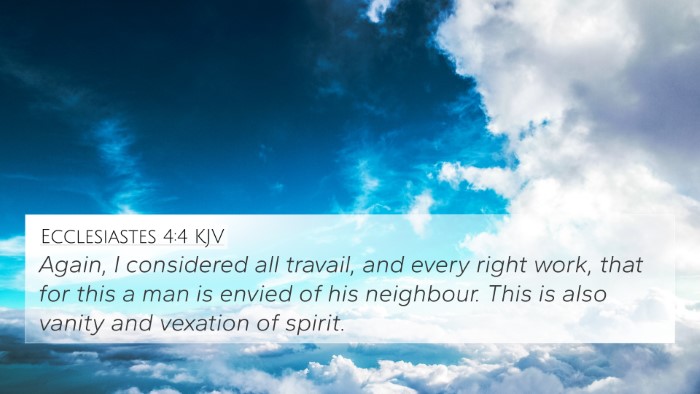
Ecclesiastes 4:4 (KJV) »
Again, I considered all travail, and every right work, that for this a man is envied of his neighbour. This is also vanity and vexation of spirit.

Proverbs 30:15 (KJV) »
The horseleach hath two daughters, crying, Give, give. There are three things that are never satisfied, yea, four things say not, It is enough:
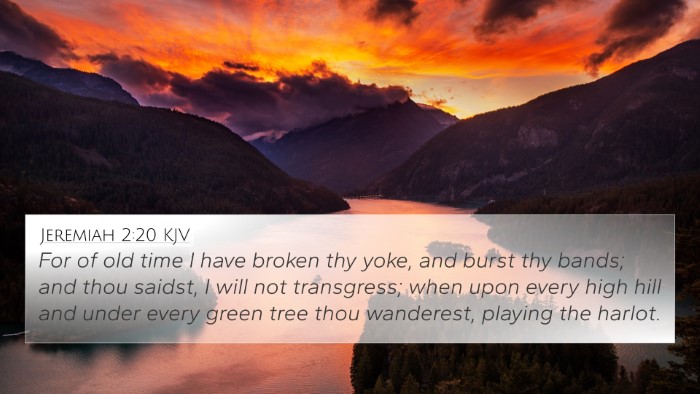
Jeremiah 2:20 (KJV) »
For of old time I have broken thy yoke, and burst thy bands; and thou saidst, I will not transgress; when upon every high hill and under every green tree thou wanderest, playing the harlot.
Ecclesiastes 6:9 Verse Analysis and Similar Verses
Understanding Ecclesiastes 6:9
Ecclesiastes 6:9 states: "Better is the sight of the eyes than the wandering of the desire: this is also vanity and vexation of spirit."
This verse explores the human tendency towards discontent and desire, emphasizing the value of what one sees and possesses in comparison to unfulfilled longings.
Summary of Insights
Various public domain commentaries offer a rich interpretation of this verse, illuminating its meaning through theological insights and practical applications.
Matthew Henry's Commentary
Matthew Henry explains that the verse can be seen as a counsel against excessive longing for things that are distant or unattainable. He highlights the importance of enjoying the present and the tangible blessings one has. The “sight of the eyes” represents the blessings currently within reach, while the “wandering of desire” speaks to the restless search for more—something inherently futile, leading to disappointment.
Albert Barnes' Notes
Albert Barnes expands on the notion of “better” by emphasizing that a satisfied heart is more valuable than a heart that is consumed by endless desires. He links this idea to a broader theme of contentment and warns against letting desires steer one away from appreciating the immediate goods and experiences one possesses. Barnes underscores that the pursuits driven by desire often lead to sorrow, indicating that fulfillment is found in recognizing and cherishing current realities.
Adam Clarke's Commentary
Adam Clarke draws attention to the existential implications of this verse, noting that a person consumed by longing will find no peace, leading to a “vexation of spirit.” He posits that mere acknowledgment of our desires can lead to dissatisfaction unless one focuses on the joys already experienced. Clarke frames the verse in a question of perspective—are we choosing to seek what is ephemeral or valuing the tangible gifts life presents?
Thematic Bible Verse Connections
Ecclesiastes 6:9 resonates with several other biblical texts that discuss themes of desire, contentment, and the vanity of worldly pursuits:
- Proverbs 14:30: "A sound heart is the life of the flesh: but envy the rottenness of the bones."
- Philippians 4:11-12: "Not that I speak in respect of want: for I have learned, in whatsoever state I am, therewith to be content."
- 1 Timothy 6:8: "And having food and raiment let us be therewith content."
- Psalms 37:4: "Delight thyself also in the Lord; and he shall give thee the desires of thine heart."
- Luke 12:15: "And he said unto them, Take heed, and beware of covetousness: for a man's life consisteth not in the abundance of the things which he possesseth."
- James 4:2: "Ye lust, and have not: ye kill, and desire to have, and cannot obtain: ye fight and war, yet ye have not, because ye ask not."
- Hebrews 13:5: "Let your conversation be without covetousness; and be content with such things as ye have."
Cross-Referencing Biblical Texts
This verse encourages a deeper understanding of life's meaning through cross-referencing other Bible verses. The nature of desire as transient and often unfulfilling can be explored through these connections, offering a holistic view of biblical teaching on contentment and satisfaction.
Tools for Bible Cross-Referencing
For further study, utilizing tools such as a bible concordance or bible cross-reference guide can enhance comprehension. Cross-referencing allows for a comparative analysis of themes and ideas, providing a broader understanding of the Scriptures. Resources like a comprehensive Bible cross-reference material or a bible reference resource can assist readers in identifying connections between verses more effectively.
Application of Cross-Referencing
Learning how to use Bible cross-references is a vital skill for deeper scriptural understanding. Here are some methods:
- Bible chain references: Follow topics across different books to see how themes interlink.
- Comparative Bible verse analysis: Study the same theme in both the Old and New Testament.
- Identifying connections between books: Compare similar teachings, for example, those found in Gospels versus Epistles.
Conclusion
Ecclesiastes 6:9 serves as a poignant reminder to focus on the present, enjoy what is before us, and be wary of the empty pursuit of desires. By engaging with this verse and its cross-references, we deepen our understanding of key biblical themes related to contentment, satisfaction, and the human condition.
